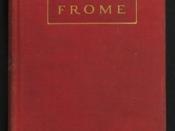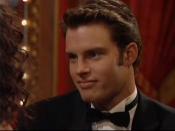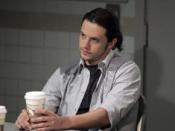Essay Question : To what extent is Ethan a victim, and what is he a victim of? Ethan has all the qualities of being a victim. He could be a victim of Zeena's sickness and cruelty, victim of circumstances and chance, a victim of his endurance and the weather of Starkfield, a victim of his conscience, and why not, a victim of Mattie's attitude at the end of the novella. The question is; is he totally a victim, in all extents, or does Wharton portrays his as a victim? The author wants the reader to sympathise with Ethan, and she creates this effect showing him as a victim and perhaps exaggerating some of the victimisers, such as Zeena. He is a victim, but maybe not up to such point as the reader may think. He can also be to blame for many thing, but the author describes every single thing as if he was a victim of every circumstance in his life.
This can be very effective, because readers usually sympathise with victims, and this is what she intended.
The main victimiser in the novella is Zeena, evidently, but she is not the only one. Zeena makes Ethan be a victim since she develops the sickness and traps him in Starkfield. He can't go away, because he can't let her alone. Above this, Zeena makes him suffer and enjoys it. She is one of the main reasons of his unhappiness. He is a victim of her "obstinate silence"ÃÂ and of her "microscopic cruelty"ÃÂ. The lack of communication and the lack of communion between them make the marriage a fallacy, and he needed someone to talk with. The writer shows Zeena as a victimiser, specifying this in the text and including the reader in Ethan's thoughts: "there had never been anything in her that one could appeal to"ÃÂ. Zeena is one of the symbols of the impossibility of his happiness, she had "taken everything else from him"ÃÂ.
Ethan is also a victim of circumstances. He is a victim of determinism and fatalism: he is helpless against fate and circumstances, he can't change what will happen, and at the same time, everything in his life ends up wrong. First he couldn't escape from Starkfield, when he would have liked to, because he "had to stay and care for the folks"ÃÂ. He couldn't do anything about it. Then, he couldn't go away due to Zeena's illness and to economic crisis, he was also helpless. There are many moments which mark this fact of Ethan being limited by chance. For example, in chapter 2, when Mattie is with Denis Eady and he can't do anything to be with her: "she stood perfectly still , looking after him, in an attitude of tranquil expectancy torturing to the hidden watcher."ÃÂ In chapter 4, when they intended to have their romantic evening alone, circumstances add to romance. First, the cat symbolising Zeena made them feel uncomfortable, it "jumped between them into Zeena's empty chair"ÃÂ. Afterwards, the cat "backed into the pickle-dish, which fell to the floor with a crash"ÃÂ. In chapter 6, "everything went wrong from the start."ÃÂ When he went into the village to find the glue one of the "greys slipped on a glare of ice"ÃÂ and it was hurt, then began a "sleety rain"ÃÂ and finally Denis couldn't help him and the woman in Homan's made him feel guilty asking for Zeena. Money was also a circumstance because when he decided to go away with Mattie he realised that he couldn't do it without money, he could have done it alone, but with "Mattie depending on him the case was different"ÃÂ. There is a sentence which can summarise the fact of Ethan as a victim of circumstances: "The inexorable facts closed him like prison-warders handcuffing a convict. He was a prisoner for life"ÃÂ the facts are "inexorable"ÃÂ, which makes everything unchangeable, he has no way out because he is trapped in life. He ends up being a victim of Mattie, due to the fact that she was the "embodied instrument of fate"ÃÂ, and if Mattie was a symbol of fate, and he was a victim of circumstances, Mattie converts into a victimiser too.
He can also be a victim of his own pride. After he had perceived the "point to which his madness had carried him"ÃÂ he realised that he couldn't do what he had planned to. He had an ethic behaviour and he wouldn't have had the "heart to desert"ÃÂ his wife, and if he would have had it, it would have been very humiliating having done it not by himself but only taking advantage of "two kindly people who had pitied him"ÃÂ. He couldn't have done what he wanted to "without too much loss of pride"ÃÂ and it seems that "pride2 counted in his "ebullition of passions"ÃÂ because he turned and walked slowly back to the farm."ÃÂ Endurance and stoicism makes him be also a victim. He can't get away from Starkfield and he still go on living. He is a victim of too many winters there: "guess he's been in Starkfield too many winters"ÃÂ. He had tolerance and strength. The numerous amount of winters represent longevity, but at the same time this tolerance makes him go on and on in a "prison of life"ÃÂ. It's not really use being so tolerant and strong if what will always prevail is awfulness and everything will end up wrong. The show will go on, but Ethan is spiritually dead: he is physically alive, but he is dead in life.





